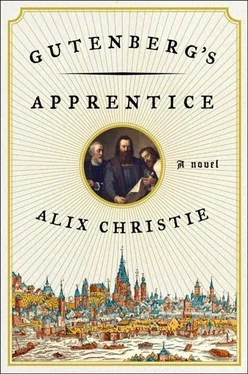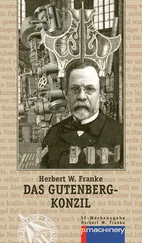“Crap,” the master thundered on, as if he had not seen. “Tin, for the love of Christ,” he bellowed. “Not iron, imbecile.”
Peter twisted up to look at him. His whole being burned with hate as much as pain. “Then label them, for God’s sake.” He pulled himself up with a monumental effort, lifting with his right arm the full bucket that contained his throbbing hand. At least it was his left.
“You watch your mouth.” The master plainly did not care that he was hurt. Hans stepped between them and said, “Buzz off, Henne, if you want your metal.” Gutenberg stopped, grumbling; he snorted once and shook his head. If Hans could only bottle that; Peter nearly laughed despite the pain. How did he have the right to call him Henne, and even better, shut his trap? He looked at the old smith with new respect. “That tallow that you have,” growled Hans, and Peter gestured with his free hand toward his things hung on the peg.
He was sent home, hand salved and wrapped in a clean rag. Where they had found it, Peter never knew; most likely Keffer tore it from his shirt. Hans pushed him brusquely toward the door and grunted when he stammered out his thanks. “Serves you damn right. Come down a notch or two now, fancy hands?” As Peter left he saw the pressman, Konrad, coming down the stairs: they’d all be forced into the smelting he had failed to do.
The little chimney clock struck nine as he slipped into the Haus zur Rosau. With stealth he climbed up to his room. His father was away, and he could not bear to speak to Grede. Awkwardly he pulled the tinderbox to him, held it underneath the elbow of his bandaged hand, and struck the flint. The flame was weak; his image flickered in the glass that Grede had hung above the basin. Peter stared a long time at his blackened face. He saw a ghastly, staring beast, eyes white against the grime that caked its skin. He poured an icy stream with his right hand and watched as the dipping of his hand, the wiping of his cheeks, turned the water from clear to black. His eyes were coals now, in that brutal whiteness. Which was he then, a man or beast? This wasn’t even work that in the end brought forth some lovely thing. A brooch, a chalice, or a gleaming monstrance could at least lift a soul above the flames. He might as well have left the farm and gone straight to the Saxon mines.
Peter dried his right hand and pulled the candle toward the parchment he had left upon the table. His Cicero had been returned without a scratch — as if to prove once more his father’s power. The calfskin bore a few dark swirls of pasture life, the residue of loam or blood or sinew. He pinned it with the elbow of his bandaged hand, moving the pumice in a growing circle with his right until the color was more even. He set the stone aside and blew, brushed off the few remaining grains. The sheet was ready now, smooth and unblemished.
He heard the voice of his first real writing master nearly every time he drew the ruling lines. Brother Anselm, at St. Peter’s on the hill in Erfurt: Your hand is but His tool . Peter flexed that tool and grasped the ruling bone. The parchment that we write on is pure conscience, on which all good works are noted. He struggled, with his damaged hand, to smooth the sheet. The ruler that we use to draw the lines for writing is God’s will . He laid his ruler flat and with his bone scored a sharp line, then dipped his quill: The ink with which we write is pure humility, the desk on which we write the calming of our heart s.
He breathed, and wrote, and in the writing felt it enter him: the stillness at the center of all things. The stillness and the soaring freedom of the Word. Not only God’s, but all the wisdom He imparted to those willing to receive it. When Peter was but shepherd’s son, he’d dreamed one day he’d be a priest — transfixed as he’d been then by all the beauty and the mystery of trees and fields. At university he took all four lower orders of theology; the Benedictines beseeched him to remain and take his vows.
But he had known — or merely prayed — that God had traced for him some other path. He knew it still, and more acutely, faced with this new devil. The candle guttered in a draft, and Peter paused. What is your meaning here, O Lord?
Père Lamasse had counseled him not even one full year ago, when Peter confessed that he desired to leave the library at the abbey of Saint-Victor in Paris. Much as he loved the worship of the monks, he felt a pull toward the swirling, pulsing world outside. The abbot touched his head and said the Lord had portioned out to each his own appointed task. This was the goal of our life’s journey: to listen and to wait, and when it came, to heed the call.
Peter sat there, feeling every heartbeat in the scorched flesh of his hand. God knew he was no priest. And if one thing was clear to him, he was no smith — and never would be.
October — November 1450
HIS FATHER RETURNED just before All Soul’s Day. Grede’s bustling — the hanging of the tapestries, the laying of the fires — let the household know that he was due. Peter’s hand was nearly healed. His stepmother had used the age-old remedies of women from the land: a comfrey poultice mixed with feverfew to leach the heat. The scars were hard to see unless you knew to look.
Fust had been gone a month by then. Grede said he might still try to squeeze in one more trip before the snows. He’d managed to evade the bishop’s ban; somehow he’d found a way to buy and sell. Peter did not ask how lucky or how foolish that might be. As he went to find Fust at the customs hall, he had more pressing matters on his mind.
The Kaufhaus had been magic to him once. Many times he had been sent by Fust’s first wife into its lofty, aromatic vault — had woven, senses stunned, among its sacks and bales to fetch the man he’d learned to think of and address as Father. It was a temple too, Fust always said — not to the Lord, but to the trade that made His world go round. Teak and tusks and barrels of Madeira; carded wool and coal; oils and spice and Rhineland wine; nuts and ores and semiprecious stones. How Peter as a boy had breathed in all those swirling scents: of skins and wood sap, tang of sweat and citrus, flavors of the distant lands from whence these goods arrived.
From the knoll outside the Hof zum Gutenberg he could see the cornice lifting up above the blue slate rooftops, surmounted by a lordly frieze of statues hewn from red Mainz sandstone: the seven prince electors — three archbishops and four worldly lords — of the Reich. Their own archbishop, Dietrich, held the center, gazing down on them with massive, sightless eyes.
The more substantial merchants kept their offices up on the gallery that ringed the trading floor. The hall was quiet, just a few high wagons left unhitched inside the portal. Peter threaded past the shrouded stalls and climbed the worn stone stairs toward the office marked “Fust Brothers.” A scribe had lettered it in gold some years before, each word inside a shield that hung from a brown fustus , the knotted branch that was the emblem of their house. Peter heard men’s voices, recognized his uncle’s, knocked and pushed the door.
“Peter!” Fust rose, smiling broadly. “You must have second sight. I only just arrived.” Indeed, he was dressed as plainly as a tinker, leggings and dun jacket splashed with mud, a filthy robe tossed on a chair. He’d have tucked whatever coin or weapon he carried right against his skin. Jakob twisted in his seat and raised a hand, a thinner version of his older brother. “Aha,” he said. “The prodigal returns.”
Peter forced a smile. “That was the youngest one of three, I thought.” He reached to shake his hand.
Читать дальше












